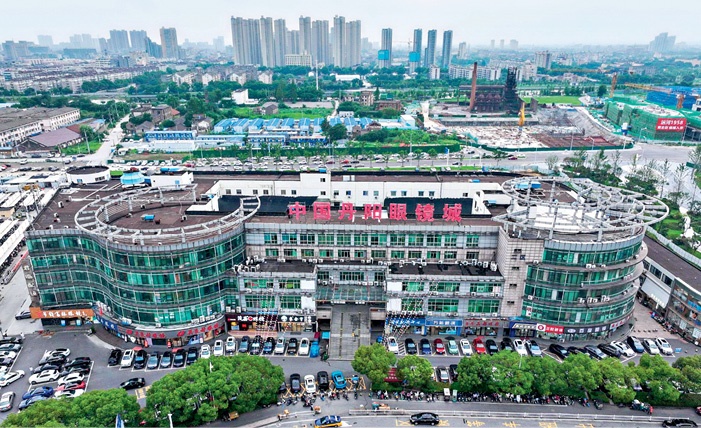
The Danyang Optical City is conveniently located within walking distance from the city’s main train station.
Stepping out of Danyang Railway Station, the large sign reading “China Danyang Optical City” immediately comes into view across the road. Inside the bustling marketplace, rows of shops offer a dazzling array of eyeglass frames and lenses, neatly displayed and attracting consumers from across the country.
In recent years, Danyang in Jiangsu Province – one of China’s key eyewear manufacturing and distribution centers – has leveraged its “small glasses” to power a “big industry.” With advances in smart manufacturing, international expansion, and the development of “eyewear tourism,” this “capital of glasses” in the Yangtze River Delta is demonstrating remarkable and sustained economic momentum.
From Manufacturing to Intelligent Production
Danyang’s eyewear industry began in the early 1960s, when a group of educated young people returning from optical factories in Shanghai and Suzhou established makeshift eyewear workshops in Situ Town. These small-scale “shack factories,” a unique local economic phenomenon, laid the foundation for Danyang’s modern eyewear sector.
Following the start of China’s reform and opening-up in the 1980s, loosened restrictions on private enterprises prompted many technical and sales staff from collectively-owned enterprises to establish their own businesses. Over the decades, Danyang – now a county-level city with less than a million residents – has grown into the world’s largest lens production hub. It boasts a complete industrial chain for eyewear integrating design, production, sales, and logistics, with products spanning the entire optical sector.
“Our family has been in the eyewear business since my father’s generation, and now my child is preparing to take over the store,” said Mr. Hu, a veteran merchant in Danyang Optical City. “In the past, we focused on eyewear production for other brands and competed on low prices. Recognition among domestic consumers was low and people preferred imported lenses. But now, local companies have increased R&D investment, and ‘Made in Danyang’ has become a mark of quality.” He pointed to lenses made by Jiangsu New Focus Optical Glasses Company used in his store: “We used to rely on traditional coating methods, but now we employ nano-film molding technology, which produces lenses that are more impact-, wear-, and smudge-resistant.”
Meanwhile, Danyang’s eyewear manufacturers also lay great store by consumer demands, developing an array of advanced functional features. “Our lenses are lightweight, highly transparent, and cater to various demands. Be it blue light blocking, anti-fog, UV protection, or progressive multifocal lenses, you can always find the type you want in one stop,” Hu added with a smile.
Beyond lens upgrades, Danyang’s optometry sector is also making strides. Jiangsu Hongxu Desheng Technology Co., Ltd. has developed a proprietary eye examination system that creates 3D eye models and processes vision data via cloud servers to produce customer-tailored lenses with a precision of within five degrees – far surpassing the traditional 25-degree discrepancy and significantly improving vision correction accuracy and customer satisfaction.
To embrace development trends of new quality productive forces, Danyang’s eyewear industry is quickening its transformation and venturing into high-end markets, including specialty eyewear for AR/VR and smart glasses equipped with real-time navigation and translation features. These advances are expanding the development scope of the industry and injecting new momentum into Danyang’s transition to intelligent manufacturing.

A livestreamer presents glasses that can be found in the Danyang Industrial Park for cross-border e-commerce. Xinhua
 Eyewear Tourism Accelerates Industry Transformation
Eyewear Tourism Accelerates Industry TransformationDuring the May Day holiday in 2024, Danyang’s eight monitored scenic spots received 277,300 visitors, with Danyang Optical City attracting 107,000 visits alone, up 29 percent year on year and ranking second in the city. What draws so many tourists to an eyewear marketplace?
According to staff at the optical city, the site was designated a national AAA-rated shopping tourism attraction as early as 2010. Powered by its strong industrial foundation, “eyewear tourism” has become a distinctive feature of Danyang. On weekends and holidays, shoppers from the Yangtze River Delta often drive or take high-speed trains to the city, pushing daily visitor numbers above 10,000 – more than most 4A-rated attractions.
“We heard about the great selection and quality of glasses in Danyang, so we drove over to buy some and do a bit of sightseeing,” said Ms. Xiao from Changzhou. “We bought three pairs of glasses and got them all within an hour at a reasonable price!”
There are many customers like Ms. Xiao in Danyang Optical City. Even on weekdays, all the parking spaces in front of the market are occupied. To convert the visitors’ flow into sustained business, Danyang’s municipal government has been devoted to transforming the area into a modern commercial hub, integrating trade, dining, lodging, and entertainment. The city has also paired cultural and sports events with its annual “Eyewear Festival” to attract a broader consumer base.
A new development zone spanning 1.09 square kilometers is now under construction around the optical city. Plans include an eyewear museum, ophthalmology hospital, and hospitality facilities, with the goal of integrating manufacturing, healthcare, and culture. This transformation aims to foster a dynamic, multifaceted urban economy based on the eyewear industry.
E-commerce Propels Global Reach
As the internationally recognized “Eyewear Capital of the World,” Danyang is home to over 1,600 optical-related manufacturing and trading enterprises. The city produces more than 100 million frames and 800 million lenses annually, accounting for 75 percent of China’s lens production and 50 percent globally. Annual sales exceed RMB 12 billion, with products exported to East Asia, Southeast Asia, Europe, and North America, making it the undisputed global leader in eyewear sales.
With the rise of cross-border e-commerce, Danyang’s international customer base has continued to grow. In 2021, the Danyang Cross-Border E-commerce Industrial Park was launched, offering livestreaming studios, office space, and public classrooms to support online business development. The park also provides training in intellectual property protection and digital operations, helping local firms expand into global markets. Sixteen enterprises have already set up operations in the park.
“We offer over 5,000 frame designs and 50 types of lens for customized orders, making us highly competitive overseas,” said Hu Hongmei, deputy general manager of Jiangsu Taojing Co., Ltd. Targeting the global market, the company now independently sells personalized glasses worldwide through e-commerce platforms.
To support continued international expansion, Danyang’s government has rolled out a range of supportive policies, including smart manufacturing upgrades, employment support, cross-border e-commerce assistance, and export tax rebates. By the end of November 2024, the city’s eyewear exports had reached RMB 4.451 billion, a year-on-year increase of 4.76 percent. From “selling products” to “promoting brands,” Danyang eyewear is stepping confidently onto the global stage – honing the golden brand of China’s glasses capital.